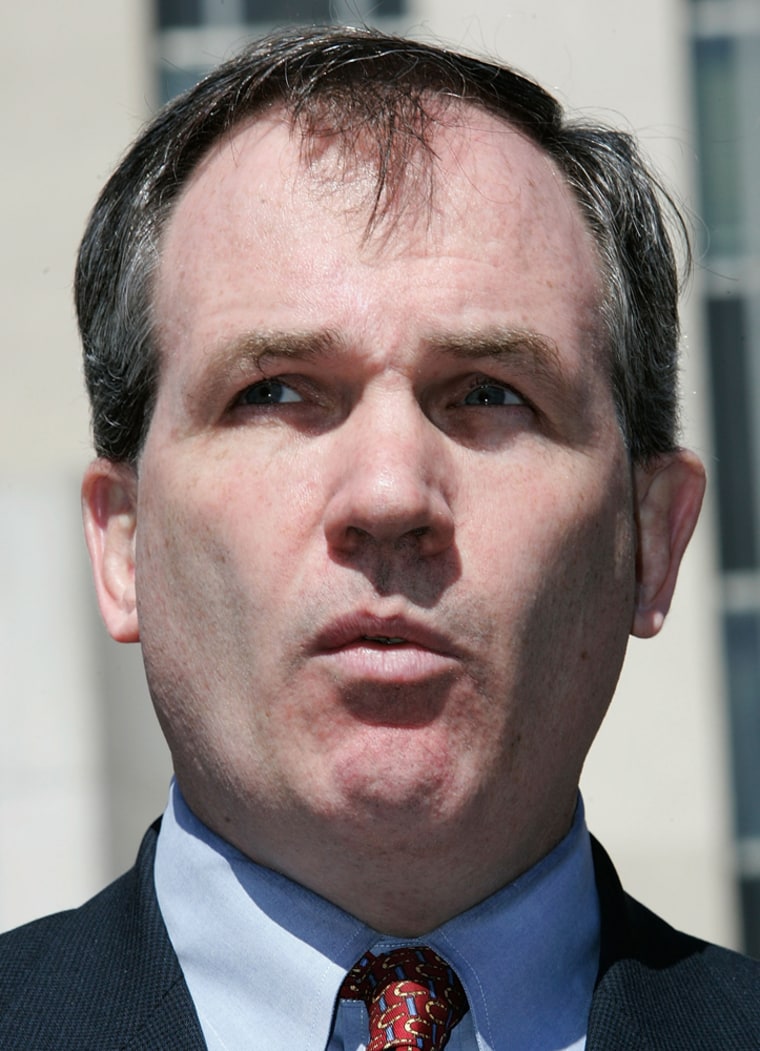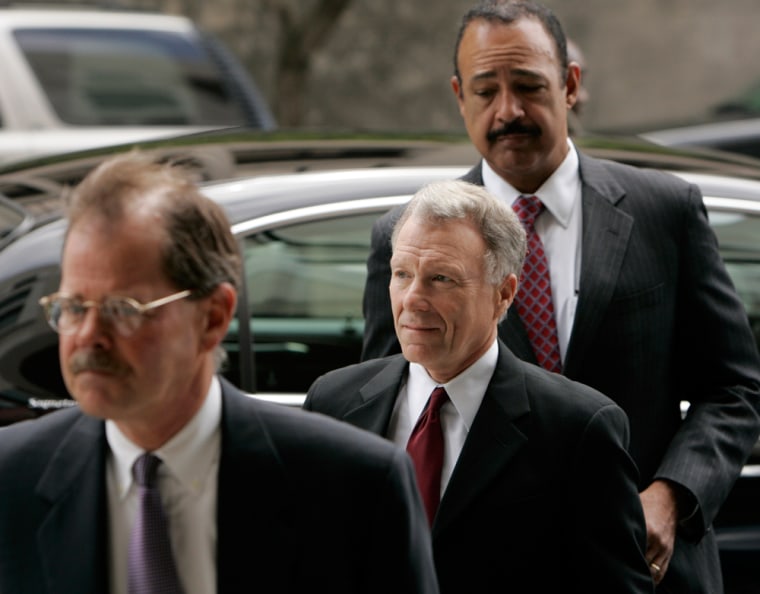Convicted top White House aide I. Lewis "Scooter" Libby, who was denied a delay in his two-and-a-half-year sentence by a federal judge and ordered to self-surrender within weeks, will file an emergency appeal on Tuesday seeking to hold off reporting to prison, his attorneys tell NBC News.
Unless the Appeals Court intervenes, U.S. District Judge Reggie Walton's ruling will stand and Libby will have only an estimated six to eight more weeks of freedom.
The Court of Appeals is in summer recess, but an emergency panel of three federal judges — whose identity for the moment is not public — will consider two things:
- whether Walton was correct when he rejected Libby's lawyers' argument that the investigation by Special Counsel Patrick Fitzgerald was unconstitutional; and
- whether Libby should have been allowed to present more evidence and additional testimony which was withheld by Judge Walton at trial.
According to William Jeffress, one of Libby's lawyers, the emergency filing will take place on Tuesday and be handled by Larry Robbins, one of Libby's newly hired appeals attorneys who argued before Judge Walton last week.
Robbins argued that by assigning Fitzgerald to investigate the CIA leak case, the Justice Department violated the appointments clause of the U.S. Constitution, and gave the Special Counsel too much unchecked power.

"Mr. Fitzgerald has the broadest delegation of prosecutorial authority of any independent counsel or special counsel that I know of," Robbins said. "I don't blame Mr. Fitzgerald... he thought he had all this power. And you know what? He probably did. That's what's wrong here, not what's right."
Fitzgerald countered, saying he disputed the charge that he had unlimited authority because he could have been fired at any time. The Special Counsel said senior administration officials, including the president, were all well aware of what he was doing and that he was "fireable at will."
Walton agreed with Fitzgerald, saying "it was not a close issue."
He said it made sense that Fitzgerald was specifically ordered not to report to officials who had close ties to the White House so that he could distance himself from those he was investigating for leaking the name of CIA operative Valerie Plame.
The judge said the alternative was to put someone with White House ties in charge of an investigation into the highest levels of the Bush administration.
"If that's going to be how we have to operate, our system is going to be in serious trouble with the average Joe on the street who thinks the system is unfair already," Walton said.
Judge Walton also said last week, as he rejected arguments to allow Libby to remain free on bond, that if the appeals court were to rule that he was wrong, then, "we as trial judges would be sitting here like bumps on a log and you can just throw out the rules of evidence."
That evidence of perjury in this case, Walton said, was simply overwhelming.
Libby, he said, talked to nine people, including the vice president, about the identity of Plame. And, the judge said, he downloaded articles about the investigation prior to speaking to the FBI and testifying before the grand jury.
Walton also said Libby gave tasking orders to officials in the State Department and CIA to find out more about Plame. The judge said Libby then told the grand jury that he didn't remember anything about her identity.
Libby was convicted of perjury and obstruction of the investigation of who leaked Plame's name to reporters. No one has been charged with the actual leak itself, though Deputy Secretary of State Richard Armitage admitted that he was first to speak with syndicated columnist Robert Novak about Plame. Novak then confirmed Plame's identity with White House advisor Karl Rove before publishing her name on July 14, 2003.
Walton said there was no reason for Libby to remain free because none of the issues his lawyers raised in the hearing seemed likely to prevail on appeal.
Federal prisoners are ordinarily incarcerated close to their homes, if possible. Libby, who lives in northern Virginia, could be sent to a minimum-security prison camp in Maryland, Virginia or West Virginia.
According to the Bureau of Prisons, minimum security institutions, also known as Federal Prison Camps (FPCs), have dormitory housing, a relatively low staff-to-inmate ratio, and limited or no perimeter fencing. These institutions are work- and program-oriented. Many are located adjacent to larger institutions or on military bases, where inmates help serve the labor needs of the larger institution or base.
The minimum security institutions closest to Washington are located in Morgantown, W.V., Hazelton, W.V., Petersburg, Va., and Cumberland, Md.
